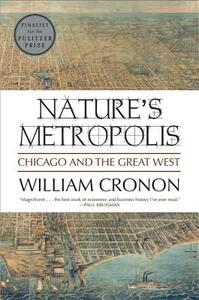You need to sign in or sign up before continuing.
Take a photo of a barcode or cover
It’s Chicago’s world, and we’re just living in it.
Took forever to finish because my first ebook copy got returned to the library, and then my Chicago library card lapsed.
Took forever to finish because my first ebook copy got returned to the library, and then my Chicago library card lapsed.
informative
inspiring
reflective
slow-paced
An approachable overview concerning the expansion of the west/Chicago during the 19th century. Viewed through an economic based lense rather than a sociologically based one(which is the default lense most history books utilize). Worth a read if trying to get a handle on American history during that time period/region.
This is a really important story to tell, both for making sense of the history of the American West, and for reframing the way we see the world in everyday life.
On the first level, I think Cronon makes a strong case that the "Great West" (everything from Lake Michigan to the Pacific) shaped Chicago, turning it into a towering metropolis. Grain, lumber, and animals (especially hogs and steer) were all brought to Chicago, where they were processed into other goods like bread, edible meat, and construction materials before being either shipped outward or consumed within the city. At the same time, Chicago shaped the Great West by functioning as an economic center. Trains centered around Chicago, bypassing the great rivers of the United States, where they were then linked to the east (especially to the American North but, to lesser extent, to the South).
At the same time, Cronon's view that cities and the countryside cannot be cleanly delineated is absolutely true, and this is especially apparent to me as someone from the suburbs. To us, Chicago isn't just the city, it's the whole metropolitan structure that extends nearly 100 outwards. I like to joke that I'm from "world's end," because my family's house is effectively on the last street before everything becomes countryside. But, it really isn't world's end. In spite of appearances, the influence of Chicago expanded (economically and socially, and still maintains its grasp) as far outward as other Midwestern states like Iowa, Wisconsin, Missouri, and as far as the Great Plains--in the period under study, I think there's a strong case that Chicago's orbit did extend all the way to the Pacific. It's a center for people, goods, cultural life, and so on. The city could not, and cannot, exist without its "hinterlands." The level of economic development experienced by the "hinterlands" also would not be the case without the city.
Really interesting stuff to chew on here. It seems obvious, but I hadn't really heard the case made in these terms before. It helps that Cronon writes in such beautiful prose.
On the first level, I think Cronon makes a strong case that the "Great West" (everything from Lake Michigan to the Pacific) shaped Chicago, turning it into a towering metropolis. Grain, lumber, and animals (especially hogs and steer) were all brought to Chicago, where they were processed into other goods like bread, edible meat, and construction materials before being either shipped outward or consumed within the city. At the same time, Chicago shaped the Great West by functioning as an economic center. Trains centered around Chicago, bypassing the great rivers of the United States, where they were then linked to the east (especially to the American North but, to lesser extent, to the South).
At the same time, Cronon's view that cities and the countryside cannot be cleanly delineated is absolutely true, and this is especially apparent to me as someone from the suburbs. To us, Chicago isn't just the city, it's the whole metropolitan structure that extends nearly 100 outwards. I like to joke that I'm from "world's end," because my family's house is effectively on the last street before everything becomes countryside. But, it really isn't world's end. In spite of appearances, the influence of Chicago expanded (economically and socially, and still maintains its grasp) as far outward as other Midwestern states like Iowa, Wisconsin, Missouri, and as far as the Great Plains--in the period under study, I think there's a strong case that Chicago's orbit did extend all the way to the Pacific. It's a center for people, goods, cultural life, and so on. The city could not, and cannot, exist without its "hinterlands." The level of economic development experienced by the "hinterlands" also would not be the case without the city.
Really interesting stuff to chew on here. It seems obvious, but I hadn't really heard the case made in these terms before. It helps that Cronon writes in such beautiful prose.
informative
slow-paced
This book is what it says at the start of the intro - a history of Chicago's role in the development of the American midwest told largely through commodity markets. A lot of non-historian readers, and even some of the historians, will not be willing to wade through the extensive discussions of the grain, lumper, pork, and rail industries which were essential to Chicago's rise as America's second metropolis, and which facilitated the development of futures trading, monopoly regulation, and shaped capital flows in the surrounding states. The author is very interested in how the 19th century midwestern economy was made by and remade nature. I don't find most of the theorizing here to be very impactful, but still think that the book does much useful, and others may find his frameworks about the natural and the urban more illuminating
informative
reflective
medium-paced
I found this economic history of Chicago and the western regions extremely interesting.
informative
reflective
slow-paced
A classic that traces the growth of Chicago from 1833-1893. In explaining "why Chicago" amid the dozens of sites speculative western boosters hoped to make the "Rome of the new world," asks, what is the relationship between human machinations and their inherited environment? production and consumption? urban and rural? Over six decades Cronon demonstrates that lived space is, of course, a combination of all of them. One especially illuminating example of the relationship between nature and the social relations that would seem to differentiate the urban and rural comes in the discussion of mid-century grain. Grain production might have brought the region formidable wealth in and of itself, but the arrival of railroads and the invention of grain elevators to load them changed the product's very meaning and the ways different actors in the region would benefit from it. Stored in undifferentiated silos, suddenly grain became a commodity that could be traded without attention to the product itself. With grain storage came the potential for grain futures and a veritable financial market to be exploited and gamed. When grain traders brought chaos by "cornering" the market and buying up supply as their futures were about to mature (forcing the fulfillers to accept their monopolistic prices), Chicago's Board of Trade emerged as the authority to stabilize prices and enforce their own sense of economic justice. In turn, they provoked the resentment of rural growers who now saw two powerful urban archetypes making decisions and money with the crops they'd cultivated. Nature gave advantages, people made things to exploit it; people's innovations changed economic meanings of nature, those economic relations recast the social world those people occupied.
One of those books that subtly reanimates timeless antinomies (determinism & contingency, structure & agency) and gives new ways to think about something in your everyday (first / natural & second / built nature). Truly the best of historical scholarship - accessible yet sophisticated, surprising but not esoteric. And (almost) no people!
A quote I liked:
"Where human beings organize their economy around market exchange, trade between city and country will be among the most powerful forces influencing cultural geography and environmental change. The ways people value the products of the soil, and decide how much it costs to get those products to market, together shape the landscape we inhabit" (50)
One of those books that subtly reanimates timeless antinomies (determinism & contingency, structure & agency) and gives new ways to think about something in your everyday (first / natural & second / built nature). Truly the best of historical scholarship - accessible yet sophisticated, surprising but not esoteric. And (almost) no people!
A quote I liked:
"Where human beings organize their economy around market exchange, trade between city and country will be among the most powerful forces influencing cultural geography and environmental change. The ways people value the products of the soil, and decide how much it costs to get those products to market, together shape the landscape we inhabit" (50)
informative
lighthearted
reflective
slow-paced
The book offers a fascinating look into the birth of a city.






